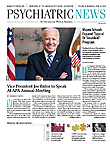Beginning this year, the standard for receiving a passing score on the American Board of Psychiatry and Neurology (ABPN) psychiatry certification examination will be based on the total score on the entire examination—not on separate scores on the three sections of the exam.
The change is a significant one that marks a departure from past years when candidates had to pass each of the three sections—basic concepts in psychiatry, neurology and neurosciences, and clinical psychiatry.
At the annual meeting of the American Association of Directors of Psychiatric Residency Training (AADPRT) last month in Tucson, Ariz., Larry Faulkner, M.D., president and CEO of the ABPN, announced the change, saying it continues a trend in which the psychiatry and neurology examinations have focused increasingly on their respective candidates and not on the candidates of the other council. (ABPN is composed of two councils—the Psychiatry Council, made up of eight psychiatry directors, and the Neurology Council, made up of eight neurology directors.)
At the meeting, Faulkner also described how new criteria in DSM-5 will be phased into the ABPN certification exam beginning in 2015, with conversion to DSM-5 terminology complete by the 2017 exam.
The change in pass/fail scoring on the psychiatry exam will be of immediate importance to candidates preparing to take the exam this year.
“Historically, psychiatry candidates had oral examinations—which were called Part 2—with neurology patients, and neurology candidates had oral examinations with psychiatry patients,” Faulkner explained. “In addition, written examination (Part 1) psychiatry candidates had to pass sections focused on neurology as well as psychiatry. The same was true for neurology candidates.”
But oral exams were phased out starting in 2008. When the board decided to phase out the oral exams, it added a third section (“clinical psychiatry”) to the written psychiatry exam and made the new three-section written exam the only certification examination.
Pass/Fail Score Introduced
“When the oral examinations were eliminated for neurology candidates and the new three-part neurology certification examination was developed, the Neurology Council decided to go to a single pass/fail score,” Faulkner said. “The Psychiatry Council decided not to do so immediately and wanted to see a few years of examination results first. Based upon the results of recent new certification examinations, it has become apparent that few candidates fail only one of the three examination sections.”
Faulkner added that combining the three sections of the new certification examination into a single-section examination with many more questions will make it much easier to achieve higher examination reliability.
Linjun Shen, Ph.D., M.P.H., vice president for test development and core competencies at ABPN, said the change in the passing standard can be beneficial to candidates in the sense that, theoretically, good performance in one area can compensate for poorer performance in other areas. “However, our data repeatedly demonstrate that performance in one area typically is highly correlated with that in other areas,” Shen said. “In other words, if a candidate is good in one area, it is likely he or she is also good in other areas. Similarly, if a candidate is weak in one area, it is not likely he or she can get too much help from performance on other areas. Therefore, regardless of how the standard changes, the best strategy of test preparation still is to be ready for all the content areas specified in the test content outlines. Betting on stronger areas to rescue the overall test outcomes can be risky.”
Shen said the “cut score” for passing the exam will be established by a Standard Setting Committee that is to meet in October and will use established psychometric methods to establish the new passing standard.
DSM-5 to Be Phased In
Also of critical importance to candidates taking the exam is the plan for conversion to DSM-5 criteria and terminology. Importantly, written examinations administered this year will continue to use only DSM-IV classifications and diagnostic criteria.
However, for years 2015 and 2016, the board will be phasing in the use of DSM-5. In those years, diagnoses and diagnostic subtypes from DSM-IV that are obsolete with the publication of DSM-5 will not be tested. As an example, substance-induced mood disorder is a subtype from DSM-IV that is obsolete.
At the same time, diagnoses and diagnostic subtypes that are new to DSM-5 will not be tested in 2015 and 2016. As an example, cannabis withdrawal is new to DSM-5 and so will not be tested.
Finally, diagnoses that are “exactly or substantially the same” in both DSM editions will be tested in 2015 and 2016 using terminology from both editions. According to ABPN, “substantially the same” includes diagnoses that have had a name change only, those that have been expanded into more than one new diagnosis, and those that have been subsumed or combined into a new diagnosis.
Examples of diagnoses that have changed in name only are phonological disorder (DSM-IV), which in DSM-5 is called speech sound disorder, and factitious disorder (DSM-IV), which in DSM-5 is called factitious disorder imposed on self.
An example of a diagnosis that has been expanded into more than one new diagnosis is hypochondriasis (DSM-IV), which in DSM-5 has been expanded into two diagnoses: somatic symptom disorder and illness anxiety disorder.
Examples of DSM-IV diagnoses that have been subsumed or combined into a new diagnosis are alcohol abuse and alcohol dependence, which in DSM-5 have been combined into alcohol use disorder. (For an example of an exam question using the dual listing of DSM-IV and DSM-5 terminology, see box, below left.)
By 2017, the ABPN exams will exclusively use DSM-5 diagnostic criteria and terminology.
At the AADPRT meeting, Faulkner and Shen said steps are being taken to make the conversion process during 2015 and 2016 as clear and seamless as possible for candidates, and they emphasized that questions will be designed to test knowledge of the concepts behind the diagnoses, not the correctness of their knowledge about the converted terminology.
“There will be instructions at the beginning of every 2015 and 2016 computer-delivered examination to explain the format of the dual listing of DSM-IV and DSM-5 terminology in the examinations,” Shen said. “Instructions will also state that it is not the intention of the examinations to test the correctness of the conversion.” ■
Information about the ABPN exam can be accessed
here.

